- Home
- Aaron J. French
The Demons of King Solomon Page 14
The Demons of King Solomon Read online
Page 14
“Oh, David…”
My body is trembling. I stand and reach for the door. Take a step. Thumping against the window at my back…
A part of my mind sees me pitch forward and collapse to the floor. My muscles tighten and I cannot move. My breath escapes my throat in a singular wheeze, one that seems to go on for an eternity. I am there, right in the spot where Ms. Joyce’s cat died. I am there, staring at a dead mouse against the baseboard while birds break their necks against the windowpane.
But, no—I am not there on the floor at all. I am following David across the circular driveway toward his shiny white Continental. The headlamps are bright and the engine is running. I hurry to keep up with David, who walks at a quick clip despite having to use a staff—
(thump-thump-thump)
—and then we are in the car, we are driving, the Lincoln’s headlights carving through the darkness of the night. On the radio, I can hear Millie Broome playing the piano. I can hear Mr. Torry singing “Three Coins in the Fountain.” I can hear Mr. Frost saying the wraith’s name over and over, the radio filling with static, the car’s engine overcoming all of it.
“Where are we going, David?”
“The other side, Pop.”
I hear noise from behind me, and I begin to turn my head. David stops me by placing a hand on my shoulder.
“Don’t look in the backseat, Pop.”
I don’t look. I turn and face forward and watch the midnight desert spread out all around us. A strange bluish light simmers on the horizon.
“I’ve missed you so much, David.”
David smiles, but says nothing. It is so dark in the car that his features are swallowed up in shadow. On the seat between us is a long wooden staff, running from the floor to the ceiling of the car. A smell like cordite briefly infiltrates my nostrils.
“Welcome aboard, Mr. Bruno,” says Max Winston from the backseat.
AMDUSIAS
Amdusias (also Amducias or Amduscias) has the shape of a human, but with claws for hands and feet, and the head of a unicorn, and he brandishes a trumpet. The demon with the greatest musical ability, he is said to be the director of the cacophonous music played in hell, and can conjure up musical instruments that play on their own. He has the rank of duke in the infernal hierarchy. Reginald Scot’s Discoverie of Witchcraft also points out that he “easilie bringeth to passe … that trees shall bend and incline, according to the conjurors will,” adding, “he is excellent among familiars, and hath nine and twentie legions.”
SYMPHONY
PHILIP FRACASSI
Father doesn’t know about this journal and if he ever found out he’d kill me.
***
Esther heard the music again.
It played over this scene: she with her mother, running through fields of impossible green. The birds-eye view of an omniscient observer would have noticed specks of bright blue, budding wildflowers among the tall grass. There were also flecks of white, beads of yellow. The meadow lay the width and breadth of heaven, and no matter how fast or far she ran, holding her mother’s cool, soft hand, she never tired, never felt her chest grow heavy or her brow grow hot. Mother wore a white linen dress, and Esther crimson silk that flowed and trailed behind her, riding the tips of the grass, giving her blood-red wings.
It came from above. Always from above.
Horns, gentle and rising in a chorus. Strings plucked and run across with a taut bow, interrupted by bright bursts of staccato wind chords, as if through flutes or sagging bagpipes. Simultaneously cacophonous and melodic. A mathematical movement stuck with barbs, an orchestra created by a genius and performed by a thousand madmen. It came from a distant point and Esther looked past her mother’s face to the sky, seeking the source. The hovering clouds were white cotton stretched thin, with puffs of gray near the horizon. A mounting storm. From there the sounds emanated, and it was toward that gray swirling cluster that they ran, headlong, faces stretched into smiles.
The clouds climbed higher, spreading like smoke from a house fire, reached over the expanse. Esther started to slow, to cry out for her mother to stop, to turn back. She pulled at her mother’s hand, but it was no longer soft, no longer cool. The fingers were thick, hard, long. The fingers entrapped her own and pulled her along at the same breakneck speed. She tried to get her mother’s attention but could only see the back of her head, blonde hair flowing, the thin white dress a writhing sack of pumping arms and legs.
“Mom!”
The head turned slightly, and Esther saw a chin, a nose in profile. The skin appeared strained, wrinkled, scabbed.
The music amplified—and, oh, it was beautiful—filling the sky end-to-end like swelling twines of muscle, straining against the atmosphere, the vibrations of chords strong enough to shake the earth. The gray clouds were above them now, and still they raced on. Rain fell in sweeping sheets, the hands of Neptune slapping across the plains, dousing them both. The linen dress clung to her mother like translucent skin, revealed her body’s slight, elfish frame. Her hair, like Esther’s, no longer flowed, but spilled over their heads like jars of paint. Mother’s pale yellow, Esther’s inky black. Esther no longer tried to scream, the raging harmony was too loud. Her vision juggled, eardrums tickled, teeth chattered from the physical strength of the music, so big it filled the world, split the sky like broken plaster. The shattered pieces fell as hail.
And still the music grew, a heaven’s worth of angels shouting down Jericho’s walls.
Above them, charcoal clouds circled in masses large as cities. A spiral funnel formed, a finger of God that pushed slowly through the fabric of the world, thrust itself down, down toward the firmament, toward Esther.
Her mother stumbled, collapsed face-down and motionless into the grass. Esther fell with her, her crimson dress running off her like warm blood. She clutched her mother’s prone head, lifted it from the ground to face her.
Her mother’s eyes were hollow, her skin stretched, flaking and calloused, her teeth crooked shards. “Stay away, Esther!” the hag that was her mother screamed. “Stay away from him!”
Esther screamed but could not hear her own voice. The song crescendoed. Thunder rumbled alongside pounding drums. Great horns wailed, cymbals crashed. Lightning rode the rain down and spit fire into the earth. Dirt flew and Esther felt the heat from the electricity.
The rushing wind tugged at her with invisible fingers, lifted her small body from the earth, gently as a soul rising from the grave toward heaven. She spun her arms, reached for her mother but she was there no more; only a charred black chasm remained, into which her body had fallen. Esther could see downward into the great fires of Hell.
And still she rose.
She began to cycle with the twister, the world spun while falling away. Higher and higher she flew, into the gaping maw of the storm. Her body flipped to face the sky. She saw slits of golden eyes above an expanding, swirling mouth. Sonorous laughter came from the great aperture, and lightning crackled at the edges of the portal like fire-born teeth. She was pulled inside, swallowed. It was darker than she’d imagined, the earth seen only in dancing slivers. A spark bit her dress and it caught with flame. Her skin burned, the meaty smoke filled her nose and her mind screamed at the hungry storm which had engulfed her to let her go or let her die.
But the music did not stop.
Even when she woke from the dream, surrounded by the banality of her shadowed bedroom, it lingered.
Rain spattered the window pane, opaque against the night. She sat up, her shirt and pajama bottoms soaked through with sweat, strands of hair sticking to her cheeks and neck. She slowed her breathing, her rapid heart. Listened. The melody remained, as it often did. Persistent. As if to say, This time, child? This time will you heed the call?
She squinted at the window, eyes adjusting to the gray-toned sketches of the landscape: the flat shadow of large meadow, the thin smoke-trail of road that led to a larger world snaking away from its edge. It was the middle of the night, and t
he moon shone strong, despite the rain. Esther nodded to the dark in acquiescence, pushed down the covers and swung her legs out of bed. Her toes dangled inches from the floor as she faced the window and studied her spectral reflection.
This time, she would heed the call.
***
The rain was different than in the dream world. The haunting music was still distinct, but faint, as if pressed against a massive membrane that separated this world from that of dreams. The sound of the drops hitting earth and flora was like the arguments of fairies, soothing with an underlying hostility. She felt observed by the rain, but did not mind.
Her clothes absorbed the cool water, turned heavy and chilled against her skin. Esther turned back once to view the pale house, misty and beaten by shadows; its half-open window a sleepy eye in the western wall of the one-story ranch home. The milk-toned walls wore sepia shingles like a sharp-angled hat. Father’s room was on the opposite side, and she did not fear his seeing her, nor did she fear his coming to her room late this night. She had learned his patterns, sly though they might be.
The sky danced with flashes, popping bulbs of lightning. The music above her swelled. Horns fattened and swayed, a melancholy dirge. She turned and ran across the knee-high grass toward the trail head. The trees that surrounded the meadow and enclosed their home were old and dense, protruding fingers of oaks, maples, birch and cedars. Beyond the woods, up and over a ridge, was the trail, an old Chippewa path kept alive by the occasional Sunday hiker and the environmental leanings of the local council. The trail was hardly ever used this close to Paw Creek, where her and Father lived, but would take you six miles north if you let it, winding along the big lake to Little Bluff, a quaint tourist town that thrived in the summer and hibernated, like they all did, in the cold months. Esther had never walked the entire way, but she and Mother had often explored the trail, marveled at the long tunnel of trees it afforded those who passed through. Just ahead was the flute where the trees opened, a dividing not unlike the Red Sea, a clear path of thin grass, rock and dirt piercing the old woods like an arrow shaft.
As she strode into the forest’s moon-dipped fissure, she closed her eyes. As rain pattered her head and cheeks and shoulders, she debated whether she truly wanted to continue. She took a breath, smelled the life in the rain. Took another.
A whip-crack of thunder, and her eyes sprang open. A chorus, sweet as a swarm of locusts, sang in her ears. The orchestra bellowed, not from the sky, but from the trees. A swelling coda of dancing keys infiltrated the surrounding wood, and as the rain slapped against earth and leaves it stopped being random white noise and instead took on a melody, a rhythmic beat, a fantastic pulse of notes flowing through her like waves of energy, a complex and torrid symphony as haunting as it was blissful. The wind gusted at her back, pushed her forward despite her uncertainty. The trees were bent unnaturally, the hardwood creaking as the tips arched into deep courtship bows, branches reaching into pointed bark-coated fingers.
This way, they said.
She ran, let the wind lift her off the ground every few steps, gently place her back in stride, heel-to-toe on the wet earth. She entered the trees, felt them watching her askance as they bowed deeper, uniformly directing her steps.
Esther saw the tunnel take a turn just ahead, darker here than at the entrance, the moonlight not breaking through. The crook in the trail was called the Devil’s Elbow, and her mother had said it came from an ancient Indian name, translated roughly to “where the spirits live.” Esther didn’t believe it of course, knew her mother was teasing, trying to frighten her. But now, alone in the dark, Esther thought it an appropriate name. She felt energy here, a tingling that carried from the bottom of her spine up through her neck and along the back of her skull.
There was a sharp break in the song, a stuttering record skip, and the trees groaned and lifted themselves straight as soldiers. She slowed, then stopped. Waited. She was confused, lost without the music. When it started again it was soft. A sonata. The trees cracked and leaves murmured. She watched in wonder as they swayed, gravitating to a synched point, the ones to the left of the path bent nearly horizontal in their reach, the ones to the right dipped so sharply as to be upside-down U’s. She stepped forward to where their leaning tips directed, a sole spot in the earth along the shoulder of the trail. She looked up, spun around, saw the tops of the trees looking back at her with stern, leaf-skinned faces.
The music rushed back like a sharp wind, frenetic and hurried. Gasping, she dropped to her knees and ripped at the soft earth with her fingers, yanked at the top layer of grass, then into the pale brown mud, pulling away rocks and small roots, tossing it behind her as she dug.
She was elbow-deep, fingers bleeding, nails chipped and split, when she finally felt something cold, unnaturally smooth. She wiped and scraped away the remainder of the mud to uncover an object shining and black. Six inches in height and intricately shaped. She dug her fingers beneath it, pried it up.
A ray of moonlight broke through the canopy, and she lifted the onyx carving into its shine. The head was a unicorn. A twisting horn protruded from the raised forehead of the creature, long as her pinky and sharp as a needle at its point. The body, however, was that of a large man. Brutish, hairy, and hunkered into a sitting position. Unnaturally long fingers sagged over his knees, his chest a mighty barrel, his stomach a protruding gumball. Legs, bent and knobby, ended in hooves.
Esther stood, swayed, felt sleepy. The moonlight was fading, her adrenaline waned. She was cold, wet. Clutching the object to her chest, she sighed and headed for home.
Minutes later she crawled through her window. The carpet squelched wetly beneath her dirty bare toes, the half-open window having allowed in the rain. She set the statuette on her nightstand, then went to the bathroom to dry herself, wash the dirt from her hands and feet.
She found clean sweats, a long-sleeve thermal, and dry fluffy pink socks. Warming slowly, she climbed into bed, scribbled blindly in her journal, then fell into a deep sleep, where no dreams could catch her.
***
Too tired to write much tonight. Sorry.
Another nightmare and some found treasure.
New friend, perhaps.
***
“Eat your eggs.”
Esther looked down at her plate, the pile of moist yellow scrambled eggs on one half, greasy fat-tipped bacon on the other. Her stomach clenched at the thought of putting any of it into her mouth, so she nibbled at the edge of an unbuttered piece of toast and studied the meal, wondering what she could do to get out of eating her father’s failed attempt at a healthy breakfast.
He pulled out a chair from across the table, sat down heavily, picked up the morning paper and slurped his coffee.
Saturdays were Esther’s least favorite day of the week. Monday through Friday she spent at school, and often tried to extend the time away from home by asking for playdates with her friends, or volunteering to help with after-school projects. Anything to keep her from returning home to her secluded prison with Father, who still had no job, paying their bills with the insurance checks that came every month since Mom died.
She poked the eggs with her fork, head bowed, and lifted her eyes to examine the man across the table. Hair graying, thin. Getting long. He looked pale and gaunt, but she knew how strong he was. He had looked different when Mother was alive. Or, perhaps, he had only appeared different to her. Rose-colored glasses of a young girl in love with a daddy who adored her, smothered her with love, protected her.
Now he was the boogeyman. A stalker of the night.
When he drank, as he did most nights, he got depressed, then, especially of late, hostile. It started with visits shortly after Mom’s death. He’d sit on Esther’s bed and cry; she’d hug him and she’d cry. Then he would stay in her bed, hold her, sleep with her until morning. At first, she loved it. But as the months went by, the visits became too ritualistic, too invasive. Esther was getting older and realizing how very odd it was. She’d t
ried to play it off at first, made a joke of it. “Daddy, go sleep in your own bed!” she’d say and throw a pillow at him, or a stuffed bear. Often he’d laugh, take the hint, leave.
But the more he drank, the less of a game it became. The less in control he was. The warmth became a chill that never left her body, the games a sullen acquiescence. When he first started groping her, she’d squirm and jump out of bed and yell at him to stop! And he would. For a while. Until he came home drunk again.
He started tying her down. Used pieces of her own clothing. Sweats or leggings, whatever was around. He’d tie her to the bed and put his hands on her. Angrily so. Sometimes, as if sickened with himself, or with her, he’d push her into the closet and jam a chair beneath the doorknob. Leave her there for the night, often well into morning, until he woke up and summoned the courage to face her.
After a while, she stopped lashing out. Stopped fighting. He never went too far, kept the damage mainly psychological, which she supposed was a blessing. But it was also, she knew, temporary. She was getting older, her body maturing, and he had noticed. It shamed her. All of it shamed her. She would look in the mirror at her own body and break down in tears, hating her own womanhood. Hating the female of her. Hating that she drew him to her in that way. Hating him, but herself more.
During those first months, when he’d become more abusive, the nightmares began. Dreams of storms and music, of being with and losing always losing her mother. Again and again and again.
He looked up at her, caught her eye and held it.
“Eat your eggs.”
She stuck a fork into the bright yellow mush, lifted a small bite to her mouth. They were cool and wet and she wanted to spew them out, but she managed to swallow. Maybe she should start handling the cooking duties. At least then she wouldn’t be eating shit every meal.

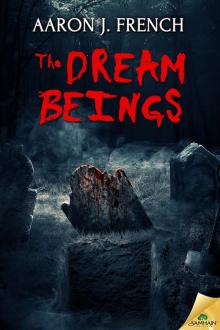 The Dream Beings
The Dream Beings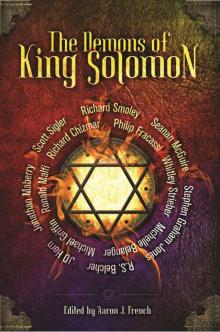 The Demons of King Solomon
The Demons of King Solomon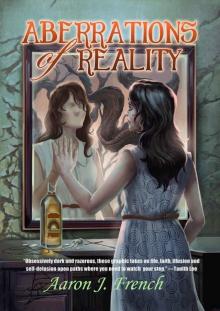 Aberrations of Reality
Aberrations of Reality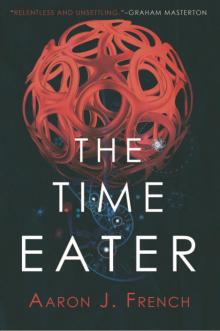 The Time Eater
The Time Eater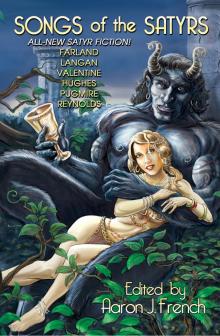 Songs_of_the_Satyrs
Songs_of_the_Satyrs